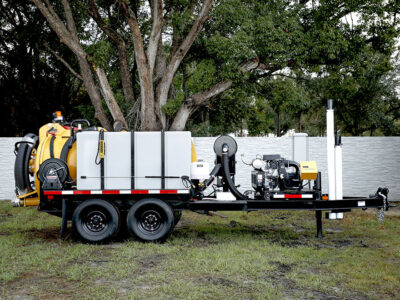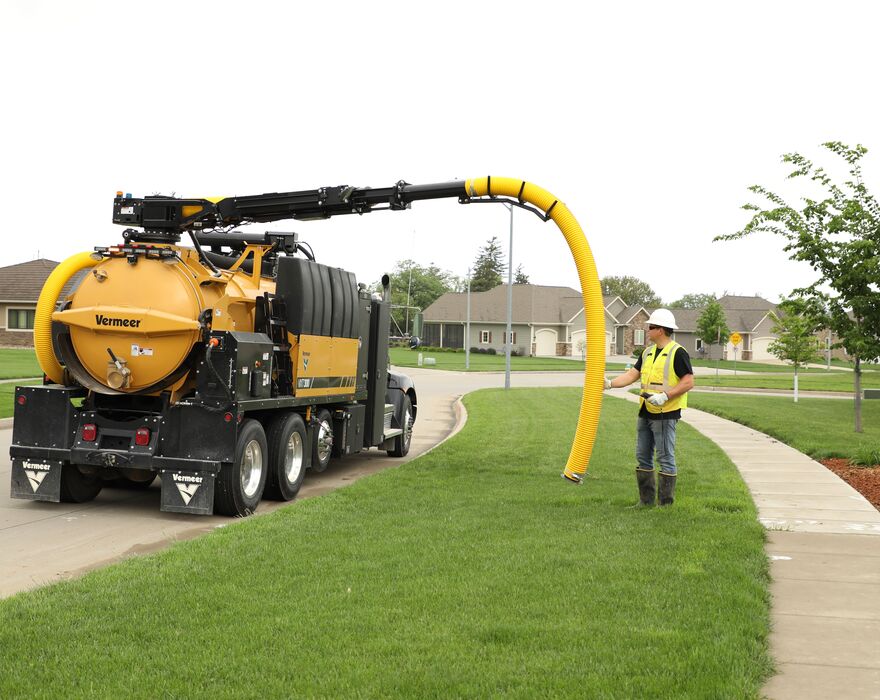It wasn’t all that long ago that most vacuum excavators on the market were equipped with diesel engines. Gas-powered vacuum excavators were thought to be underpowered with a shorter life expectancy than similarly sized diesel-powered units. However, today’s advanced gas engines and the added costs associated with new Tier 4 diesel engines have left many contractors reevaluating their stance on gas-powered vacuum excavators.
According to Jake Jeffords, director of sales, marketing and global accounts at Vermeer MV Solutions, the capabilities of gas-powered vacuum excavators have expanded dramatically in the last few years. “Gas-powered vacuum excavators have always been a good option for contractors using them to support a horizontal directional drilling crew with fluid management,” he explained. “However, many older gas models couldn’t move enough cubic feet per minute (cfm) of air to efficiently pothole buried utilities. Today, there are high cfm gas-powered vacuum excavators available that are more on par with similar-sized diesel units.”
Market shift to gas-powered vacuum excavators
More than two decades ago, the U.S. Environmental Protection Agency (EPA) introduced a tiered series of emissions regulations designed to reduce the carbon footprint of off-highway equipment. Since the regulations went into effect, engine and equipment manufacturers have worked together to meet each of the EPAs tiered regulations, and today’s advanced Tier 4 diesel engines are the results of that work. Tier 4 Final engines reduce carbon emissions, increase fuel efficiency, and allow for longer service intervals — but cost significantly more to purchase.
Meanwhile, as diesel engines were being reengineered to be compliant with Tier 4 regulations, smaller gas engines were also being redesigned with sophisticated computer controls and high-pressure fuel delivery systems to optimize power and fuel efficiency. Today, most gas-powered vacuum excavators have electronic fuel injection (EFI) engines that are more reliable and powerful than older carburetor engines.
“The rising costs of purchasing diesel-powered equipment and the performance improvements of EFI gas-powered machines is leading many contractors to run more of a mixed fleet,” explained Jeffords. “The switch started with the trucks they drive to the job and is expanding to support equipment, including vacuum excavators. It’s a trend that is likely to continue as long as they don’t have to sacrifice performance. In fact, contractors working in colder climates might be better off with an EFI motor because they start much easier on cold days.”
High cfm vacs change the perception of gas-engine vacs
Gas-powered vacuum excavators have been around for many years, but Jeffords said he has noticed a shift in use since Vermeer MV Solutions introduced its CV SGT high cfm vacs with a 1,000-cfm (28-m3/min) vacuum pump powered by a 38-hp (28.3-kW) EFI gas engine. “Contractors used to complain that gas-engine vacs didn’t have enough suction power for potholing in clay and other challenging soil conditions,” he explained. “The introduction of high cfm gas models changed that. These new models deliver the same vacuum performance and have the water pump capacity to deliver plenty of pressure to loosen up material. There is not much of a performance difference between high cfm gas vacs and diesel-powered units in the 3-in to 4-in (7.6-cm to 10.2-cm) diameter hose size vacuum excavator market anymore.”
Jeffords went on to say that high cfm gas-powered vacuum excavators have a lower price tag than their diesel counterparts with similar performance levels. “While gas-powered vacs are more economical to operate because of the lower upfront purchase price, gas engines tend to not last as long as a quality diesel engine,” he said. “That is the trade-off that contractors need to wrestle with. However, in many instances, the price difference between gas and diesel engines is substantial enough to offset the costs of having to replace a gas engine down the road. Over the road, gas-powered vacs have an advantage because they usually don’t weigh as much as diesel units. A few hundred pounds can make a big difference when hauling a tank of slurry.”
Choosing a diesel-powered vacuum excavator
Investing in a quality vacuum excavator with a diesel engine is still a solid investment for contractors. Diesel models may hold their value better than gas-powered units. This makes a difference for any contractor who likes to upgrade their fleet often. Also, while gas-powered vacuum excavators match up pretty well within the 3-in to 4-in (7.6-cm to 10.2-cm) hose size class, diesel is still king in the larger vacuum excavator sizes. “Maybe someday gas engines will be able to better compete in those higher categories. But, for now, advances in the smaller categories are leading the way,” added Jeffords.
Gas-powered vacuum excavators vs. diesel-powered vacuum excavators — the choice is up to you.
Vermeer MV Solutions, Inc. reserves the right to make changes in engineering, design and specifications; add improvements, or discontinue manufacturing at any time without notice or obligation. Equipment shown is for illustrative purposes only and may display optional accessories or components specific to their global region. Please contact your local Vermeer dealer for more information on machine specifications.
Vermeer and the Vermeer logo, are trademarks of Vermeer Manufacturing Company in the U.S. and/or other countries. © 2023 Vermeer MV Solutions, Inc. All Rights Reserved.

